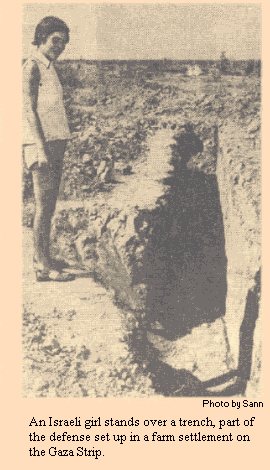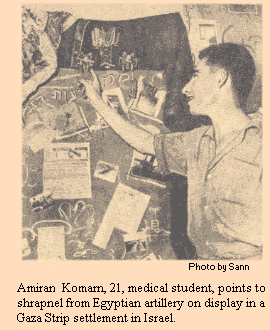 By Paul Sann By Paul Sann
 Israel, one eye on peace, one on war, walks with its head high. I couldn't find fear there.
Israel, one eye on peace, one on war, walks with its head high. I couldn't find fear there.
What Israel grew in the desert is one thing. You can't say enough about the Jewish State's triumphs over the Biblical wastes. But what it grew in the hearts of men is even more stirring.

Go back to the night of Aug. 31-Sept. 1, when Israeli troops climaxed 10 days of see-saw fighting on the Gaza Strip by storming into Khan Yunis and blowing up the headquarters of Egypt's border commandos, the Fedayeen (Self-Sacrificers).
Israel counted one of its men dead and eight wounded but Egypt suffered its worst single blow--38 dead and 40 wounded. Both sides moved armies to the Gaza plain. All-out war appeared so close that Israel ordered a general mobilization that night.
I wasn't there then, but a couple of weeks ago in Tel Aviv I talked to a man who was and--though not in the regular Army--had something to do with the mobilization. Here is the way he told it to me:
"You wouldn't believe what happened in this city. You wouldn't believe it if you saw it. It was so quiet, so orderly, no wailing.
"I was all over the city and I never saw anything like it, not even in 1948. There wasn't a building that wasn't affected--not a store, not a house, not an apartment. There was hardly a family that didn't see a son or a brother or sister or even a father go off. I didn't get home to see my boys go.
"But the thing was--what I mean to impress on you--everything was so orderly. There's maybe 350,000 people here and in Jaffa. You can imagine how many had to leave their homes and go to the Army--and it was so orderly.
"I didn't have anything to do. I'm supposed to help in a mobilization but I went around the whole city and I didn't have anything to do. Nobody knew anything about Khan Yunis--they knew there was trouble on the Gaza Strip since Aug. 22--but everybody knew about the mobilization the second the call came.
"And everybody went and the city was quiet. They just picked up and went and you wouldn't know the difference. Life just went on--and Tel Aviv is only an hour from the Gaza Strip. There was just no excitement like you would imagine in a thing like this."
Indeed, there was so little excitement that the world outside didn't know Israel had mobilized for the worst on the night of Khan Yunis. The world outside had no idea--except in military and diplomatic channels--that the Arab-Israeli showdown was inches away on Sept. 1.
And what happened the next day?
Israel went back to work. When I got to Tel Aviv the last week in September the mobilization was such a distant memory that nobody mentioned it to me for six days. It was just something that happened and that was that. In Israel, you pass on to the next day's labors.
I talked to a government man about the Israeli attitude toward war with the Arabs. For obvious reasons, I can't identify him, but this is what he told me:
"What's the use of kidding ourselves? The other war never ended. We didn't win it--the Arabs quit. They ran away. I was in the whole thing. I saw it. They just ran--and what happened? They had victory parades in some of the Arab countries; the Egyptians had a real big one in Cairo.
"So where are we? We never had a chance to beat them right. The Arab leaders never told the people they had to run because they were losing. They just told them there was an interruption in the war--the United Nations made an armistice--and later on they would come back and kill the Jews.
What can that mean in Israel? For seven years that's all day: they are coming back to get even, to wipe us out. The children here grow up that way, hearing those things. The rest of us always took it for granted anyway. When did we ever live in peace?
"When I came here from Europe in 1936, running away from Hitler, the Arabs and the Jews were fighting. They were trying to chase us out then--when weren't they? And what were we doing--we were trying to chase out the British.
"And what happened after that--we went into the Jewish Brigade for the British, a lot of us, and we went to fight the Nazis. All of a sudden we were fighting side by side with the Englishman after trying to blow him out of Palestine with dynamite for so many years.
"So we came back here in 1945 and right away we had to fight the Arabs again--1947, 1948, 1949--and we're still fighting.
"Where is peace? How could anyone talk about peace? You know you can't live in peace but you have to stay in Israel, no? You build it yourself and you fight for it and you have to stay.
"Where else is there to go?"
You hear that theme everywhere.
& I heard it my first day in Tel Aviv on the way to my hotel. I asked the taxi-driver, Jacob Avram, about the situation with the Arabs--
"What situation?" Avram said, "There's no situation here, nothing new. Everybody who comes to Israel asks about the situation. I always ask them what situation. I came here from Romania 16 years ago and there were riots with the Arabs.
"Then there was war. I was a driver and I'll be a driver again--no exceptions. Why not? We have to live here.
"Take the Jews from the Iron Curtain countries, like me. All their life they wanted to come here--before the business with the Russians. How can they think of going to any other country? Who wants them?
"So we have to fight to stay here. Life is hard here, everybody works hard, but we couldn't be any place else. Ask everybody you want. He says, 'I must fight. It is my country.' And he'll tell you we have to win, there is no other way.
"And if we go to fight we fight full up. We fight till the last drop of blood. Everybody fights--men, women, girls, boys 16. Nobody was afraid last time.
"And what's the difference? You fight even if you're afraid. You have something to fight for, and you fight. That's why we can beat the Arabs."
I have notebooks full of quotes  like that. Nothing changes but the accents--all the words are the same. It's understandable Israel is a great melting pot. like that. Nothing changes but the accents--all the words are the same. It's understandable Israel is a great melting pot.
Into it went all the persecuted and dispossessed or unwanted Jews of the last half century. From Czarist Russia's pogroms, from Nazi Germany, from Poland and Hungary and the Iron Curtain countries when they could get out, from Iraq and Yemen and now (45,000 this year), from North Africa.
Others came from such places as America, Canada, Britain and France because the homeland was in their hearts. They were Zionists. They wanted a hand in building the Jewish State.
And while the infant nation is no bed of ease and luxury, while there are many hardships and lengthening war clouds besides, only a comparative handful of those who had another haven to go to have gone away.
Out of the 750,000 who came in since the Jewish State was born, 63,000 had left through last year--and some of them declared their intention to leave in time when they came to Israel.
How many have left this year--with war closer than ever? The figure for January through July is 1,997. No matter what the emigration is for the rest of the year it will be the lowest since 1948, when 1,154 left Israel.
Those are meaningful figures.
They bear out what everyone tells you, from Haifa to Jerusalem to Tel Aviv to the Negev: they'll stand and fight on their ground if they must. There are indeed very few exceptions.
"You don't have to be a Zionist, or even a Jew, to be impressed by it."
____
|

